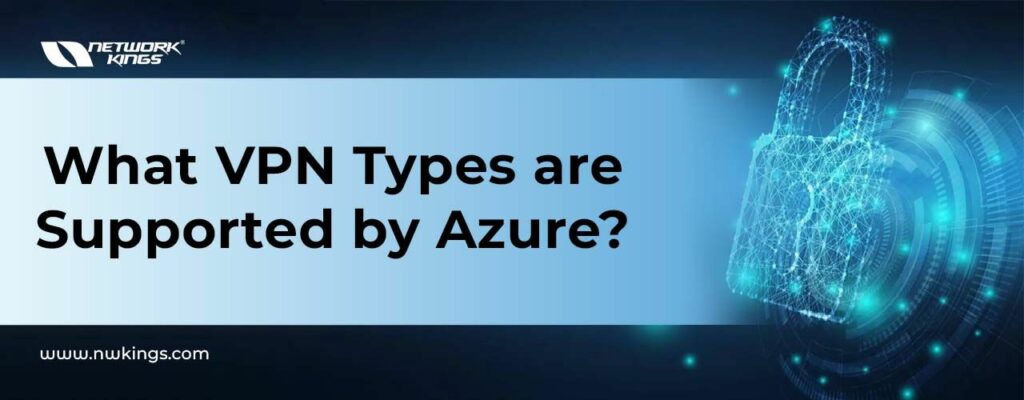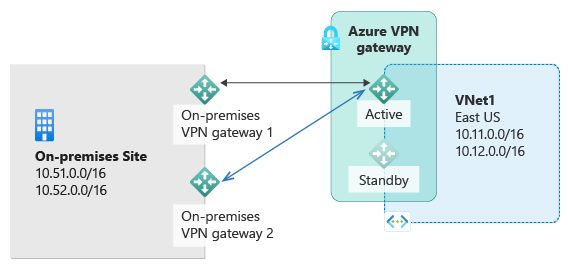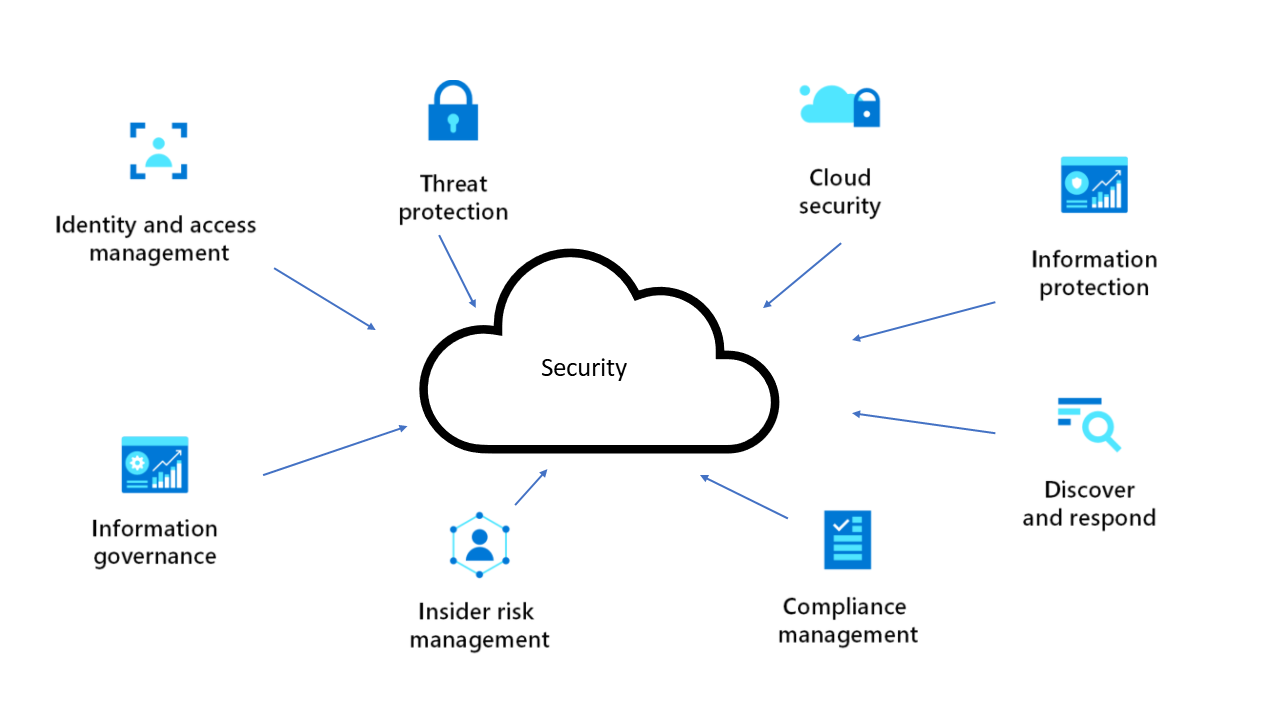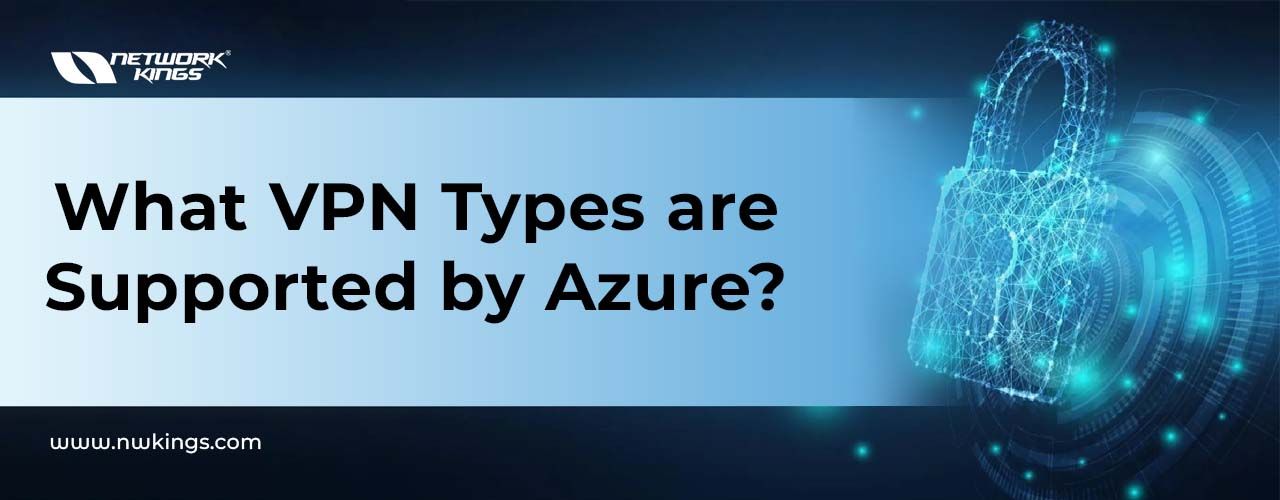
What VPN types are supported by Azure – let us know those in detail. Are you on the hunt for a dependable VPN solution that has Microsoft Azure’s back? In light of all the increasing worries over cybersecurity, it is vital to be aware of what sorts of VPNs are endorsed by Azure to safeguard your data and uphold secure cloud connectivity. This blog aims to examine different characteristics and security protocols when using distinct types of VPNs backed up by Azure plus how these virtual networks can lend you a hand with keeping your information as safe as houses. Interested? Let us dig deeper!
Understanding the Concept of Azure

Coming to grips with the idea of Azure can be intimidating for a lot of IT specialists. After all, it is an internet-based platform that lets organizations create and administer applications and services on the web. The way forward in getting your head around what compatible VPNs with Azure is knowing how they work – IPsec (Internet Protocol Security), SSL/TLS, and PPTP being among the most typical ones used. In particular, IPsec encrypts data packets sent between two points over the net by using encryption protocols.)
IPsec (Internet Protocol Security) is a great secure protocol that can be used with both fixed and dynamic IP addresses, making it ideal for securely communicating between two or more networks in different places. Moreover, IPsec also provides an added level of authentication as well as data integrity checks which ensure your information remains safe even when being sent over long distances.
Furthermore, SSL/TLS (Secure Sockets Layer/Transport Layer Security) is another reliable security protocol that utilizes robust encryption to protect any data traveling from one point to another across the web. So if you ever find yourself needing to send sensitive material online then these protocols will help keep it safely under wraps!
Unlike IPsec, it provides only authentication instead of encryption but still keeps your data secure during transmission as it offers an extra layer of security beyond basic authentication methods like usernames and passwords. This mutual authentication between two parties means you know exactly who you are talking to before disclosing any sensitive information – how reassuring is that? PPTP (Point-to-Point Tunnelling Protocol) on the other hand has been around for a while now, yet remains popular when creating encrypted connections across the internet without having to configure encryption directly onto each device.
It is easy to set up and can be effortlessly managed by users with no technical understanding whatsoever; however, given its age, PPTP isn’t as secure as more modern protocols so it might not be the best choice for use with business networks or other sensitive applications which require stronger security measures.
To sum up, there are three primary types of virtual private networks supported by Azure – IPsec, SSL/TLS, and PPTP – although depending on your needs one may prove to be a better fit than the others. Knowing which of them fits best into your requirements will help get the most out of utilizing Azure for your organization’s cloud environment and online activities – after all what good is an extra layer of security if you don’t know how it works?
Diving into the World of Virtual Networks: What VPN types are supported by Azure

Diving into the world of virtual networks; there is an array of different types supported by Azure. Each type has its own set of unique characteristics and advantages for certain applications or workloads. For those who may be new to networking, comprehending all these possible options and deciding which one fits your requirements can feel overwhelming. That is why we will take a closer look at some well-liked VNet types that Microsoft Azure offers – exploring what each brings to the table for businesses or enterprises running specific apps.
A popular kind of VNet utilized on Azure is known as a Site-to-Site VPN. This type of network links two or more physical sites through an encrypted tunnel making use of Internet Protocol security (IPsec). It provides end-to-end encryption between numerous locales to safeguard information sent across public or private networks, plus it allows for centralized control so administrators can supervise devices from one place remotely. Typically these site-to-site VPNs are perfect for organisations with various branch offices placed around separate cities and countries. How easy would managing multiple places be if you could do it all in the same spot?
Point-to-Site VPN is another popular type of virtual network, providing a way for individual computers and devices to access a secure corporate resource from outside the office without having to buy any additional hardware like routers or firewalls. It is hassle-free too; all users need are the right credentials and permissions, plus scaling up point-to-site connections can be done with ease if needed. What’s more? The benefit of this connection is that it provides end–to–end encryption throughout transmission and reception time – adding extra security protection when accessing resources remotely.
Azure also facilitates ExpressRoute circuits, which are dedicated leased lines that permit direct connection between the user’s premises and Azure’s cloud services via the existing telecom carrier connections instead of using conventional internet links such as DSL or Cable Modem. The remarkable thing about ExpressRoute Circuits is its unswerving reliability with low latency (<20 milliseconds), jitter (<2 ms), and packet loss (<1%). This makes them ideal for mission-critical workloads where redundancy and dependability come first like financial services or gaming applications needing heavy real-time data traffic without any interruption – don’t you think?
How Azure Supports VPN?

Azure offers a range of Virtual Private Network (VPN) options, letting users make secure networks to join computers, mobiles, and other important systems. Microsoft Azure takes advantage of its software giving an effortless virtual private networking solution for their clients. Depending on the VPN that is needed by you, Azure provides various solutions that are appropriate for different kinds of companies or organizations. The most popular type of VPN provided through Azure is a Point-to-Site connection.
This sort of link allows a user to securely connect from any location with an internet connection that is provided by their company or an internet service supplier. It is fantastic for businesses that want to keep their data and information protected whilst still permitting users access to resources anywhere in the world. The Point-to-Site connections make use of Secure Sockets Layer (SSL) encryption technology, ensuring that encryption and authentication are both present when you are connecting over the web – keeping your data safe at all times!
Another popular type of virtual private network supported on Azure is Site-to-Site connections; something which provides great flexibility for organizations wishing to have direct links between office locations as well as public clouds such as Google Cloud Platform – providing them with peace of mind knowing they can trust what’s going through this secure point?
This kind of link allows two or more places from your network, like branch offices and warehouses etc., to securely communicate over a shared network infrastructure. Site-to-site connections make it simpler for businesses and organizations that have multiple physical sites spread across diverse areas or countries as they can easily access each other’s resources without the need to set up separate private networks at each location. What makes this type of connection so useful is its ability to provide remote locations with secure connectivity while eliminating massive expenditure on costly leased lines – a real bonus!
With Site-to-Site connections, all the traffic traveling between connected sites is encrypted and authenticated using IPsec technologies to make sure only authorized people can access the resources being shared amongst each of these websites. It’s also doable to bring together different kinds of VPN links so you get more out of your network solution.
By bringing Point-to-Site and Site-to-Site connections into play you will have a chance to benefit from both types of secure networking solutions while still keeping flexibility up when it comes to remote users as well as any persons connecting from inside your infrastructure. Furthermore, this offers an even stronger level of security since now you can monitor incoming and outgoing data transfer so that no unauthorized activity takes place on your system – thinking about which could be a nightmare!
The Different Azure Types Explained

Have you ever worked in the IT industry? If yes, then you must have heard of Azure. It is Microsoft’s cloud-based computing service and it has become one of the most preferred ways to host applications or websites lately. With Azure, users get access to several different types of virtual networks (VPNs) so let us take a closer look at what each type offers. The first up on our list is Site-to-Site VPN (S2S). This version allows users to directly connect their existing onsite network with an encrypted tunnel for maximum security while using Azure services.
It is also possible to use a VPN for linking two or more physical sites. This allows firms to move certain workloads, or even pieces of their infrastructure into Azure without tinkering with the network topology. The downside is this needs manual setting-up and maintenance, which can be costly in terms of both time and money. Another option available through Azure is Point-to-Site (P2S) – it creates a secure connection from individual computers/devices directly into the cloud environment…but have you ever considered what benefits that could bring?
Bypassing the public internet and connecting directly to Microsoft data centers via private leased lines or MPLS networks is possible with ExpressRoute. This allows businesses to keep control over their networking environment as traffic won’t be traveling through public channels, plus it provides maximum security and reliability – although this comes at a premium cost in contrast to S2S VPN or P2S VPN options which are more affordable.
But if you are looking for remote workers who need access to cloud resources safely and securely, then these cheaper alternatives do have an upside; they avoid the requirement of having dedicated hardware for site-to-site connections. The downside though is that end users don’t gain any access to corporate systems such as emails and file storage so additional authentication would still be required when accessing from outside the office – perhaps raising questions about how secure those services are.
Decoding VPN Support in Azure

Gaining traction amongst businesses globally, Azure offers a wealth of VPN features – from site-to-site and ExpressRoute to Point-to-Site. So what can you expect if you go down the route of implementing an Azure VPN? Well in this blog we will get stuck into exactly that; breaking down everything Microsoft’s cloud solution has to offer when it comes to setting up a secure virtual network.
With its never-ending array of features for securing links between users, resources, and areas, Azure brings a thorough solution suitable to all kinds of commercial scenarios. To commence with, let us explore the distinct varieties of VPNs available through Azure: Site-to-Site (S2S) VPN protocols help connect several sites across different networks utilizing any encryption technology like IPsec or SSTP protocols. Whilst keeping this link between these places secure it allows shared access to data over the internet or other WAN connections – how super cool is that?!
ExpressRoute is another of Azure’s services that enables reliable and private connections from an organization’s own data centers/private clouds straight into Azure, via dedicated fiber links or public internet circuits – all without the need to cross the regular web as with typical VPNs. Point-to-site (P2S) Virtual Private Networks are a great option for organizations with limited needs who don’t need an entire site-to-site solution yet still want to connect their users securely over a remote link using their very own authentication measures instead of relying on third-party providers for confirmation. It is worth noting though there may be other requirements which mean Express Route could be more suitable.
P2S employs Secure Socket Tunnel Protocol (SSTP) based on SSL technology, enabling local devices to tunnel into an instance running in an Azure Virtual Network by authenticating with either Enterprise Certificate Authority or self-signed certificates generated by users. This provides businesses with the opportunity for cost-efficient connectivity and safeguards against bad days like hardware failures or DDoS attacks; Microsoft’s Dynamic Routing Gateways make this possible through multi-protocol label switching connections via express route gateways.
Windows Server 2016 also makes up part of Azure offerings – delivering high-end security features such as Advanced Encryption Standard 256 (AES 256), Internet Key Exchange version 2(IKEv2), Dynamic Multipoint Virtual Private Networks (DMVPNS), and IPsec protocols. Whether it is basic safety measures you are after, or something more substantial suited to corporate settings – there’ll be a solution available from Microsoft’s global collection of networking tools and services!
Security Protocols Used by Azure

When it comes to Azure, Microsoft has a whole host of security protocols in place that ensure your network is properly safeguarded. When selecting a cloud provider, one of the most essential things to bear in mind is ensuring there’s an effective security system in situ – and with Azure, this certainly isn’t something you need to worry about as Microsoft has firmly got this covered. A wide selection of solutions are employed by them which all help protect data and networks from unauthorized access; such as Transport Layer Security (TLS), designed for secure connections between client and server – keeping malicious actors away!
TLS works by encrypting data while it is being transferred over the network and also verifies both sender and recipient identities to make sure only approved users have access to sensitive information. On top of that, TLS utilises certificates for verifying a server identity which guards against malicious attacks like man-in-the-middle assaults or phishing attempts. Why is IPsec important too? It creates an encrypted connection between two computers across untrusted networks – such as the Internet – giving authentication and encryption coverage for all transmitted data through this link.
Azure provides some great security measures, such as packet filtering which can detect and prevent intrusions, data integrity checks, and more – all designed to guard against malicious intent. Additionally, it supports Point-to-Site Virtual Private Networks (VPNs). This allows users who aren’t on the same Local Area Network (LAN) to securely communicate with each other through encrypted tunnels without needing specialist software or hardware installed. In essence, this type of VPN gives organizations a cost-effective way for mobile employees to remain connected whilst protecting their networks from potential threats.
Microsoft has you covered when it comes to guarding your data safe using Azure’s services regardless of what kind of VPN protocols you choose; IPsec & TLS authentication and encryption protocols provide secure verification while Point-to-site ones give remote staff access remotely in safety. So basically there are plenty of options available that help ensure your information is outta sight!
Azure's Role in Cloud Connectivity

Azure is Microsoft’s cloud-computing platform, offering a secure network of services and virtual private networks (VPNs). These enable users to directly connect with their own organizations’ securely protected data through the internet. When connected via one of these VPNs, it feels like actually being within the company firewall as you can access documents safely. Both site-to-site and point-to-point are supported on Azure. A site-to-site connection establishes an encrypted tunnel between two businesses that could be utilized for long-term use or managing resources at distant locations – how convenient!
It is very handy for businesses that have several office locations, as it grants them access to a collective pool of resources. Many companies make use of this sort of VPN to safely gather data from different physical premises and store it all centrally. Additionally, employees can log into internal applications without having to do so repeatedly – how convenient!
Point-to-site Virtual Private Networks are generally employed by individuals who require remote entry for specific purposes such as working away from the workplace or gaining admittance to certain details and programs at other sites. Perhaps you’re one of those people?
This kind of link gives individual users the means to securely get connected to their organization’s local area network (LAN) from any point on the internet, thanks to an encrypted passage provided by Azure.
The said tunnel ensures that every piece of data going through it remains secret even while moving across public networks like the web. What security protocols are used relies upon what form of authentication has been chosen – biometric scans, passcodes, or two-factor authentication can all be utilized depending on your company’s needs.
Azure provides a haul full of tools that make it effortless for you to manage both kinds of VPN connections; letting you scale up and down as desired to maximize efficiency levels. By using the advantages given by Azure organizations have at their disposal ways they can guarantee high standards when it comes to respecting privacy whilst providing employees with convenient access via remote connection to Azure towards corporate resources without having performance/accessibility cutbacks in tow.
Azure and the Future of Virtual Networks

Many organizations are now taking advantage of the powerful capabilities that Microsoft Azure can provide when it comes to virtual networks. Its significance in shaping up the future of such networks is undeniable, and for good reason – Azure supports a wide range of VPNs including site-to-site (S2S) and point-to-point (P2S), both offering top security measures so users don’t have to worry about data transmission safety even if they’re dealing with complex hybrid environments. How far will this trend reach? We shall see!
When it comes to virtual private networks (VPNs), there are two main types; site-to-site (S2S) and point-to-site (P2S). S2S VPNs require dedicated hardware such as routers for communication between two sites, whereas P2S relies on modern Windows applications running on computers or mobile devices. Despite the differences, both provide a secure connection across different premises making them an ideal choice for organizations with multiple locations or remote employees.
Additionally, Azure also provides ExpressRoute connections which allow direct connectivity from your organisation’s network infrastructure – i.e., routers and switches – right into its virtual network setup – sounds like a great way of taking control!
Having ExpressRoute connections in place allows for added security since all traffic sent over the connection is encrypted – there’s no need to encrypt it at the application level. On top of that, you can make sure your data stays secure and is only accessible by authorized personnel or applications within your network. Plus, with these sorts of connections, you get faster speeds and lower latency as everything bypasses the public internet completely!
All-in-all Microsoft Azure has comprehensive support when it comes to various types of VPNs so businesses can securely connect their private networks to external resources safely without compromising on any privacy or security standards. Whether you require S2S (site–to–site) solutions for remote access; P2S (point–to–site), which establishes a single tunnel from an individual client machine through which users can have secure connectivity; or enhanced protection via Express Route options – Azure will have something suitable with its vast range of tools & services available for virtual networking needs!
Best Usage Scenarios for Azure VPN Types
When it comes to virtual private networks (VPNs) connected to the cloud, they come in all shapes and sizes. Some may be well suited for heavier workloads while others will do perfectly fine when dealing with light or medium loads – though this doesn’t mean that all VPN types are equal. Especially so if you are looking into using the Microsoft Azure platform: what type of connection to Azure would work best?
To help answer your question, let’s look at five distinct VPN types supported by Azure – Point-to-Site (P2S), Site-to-Site (S2S), Azure Virtual WAN, VNet-to-VNet and ExpressRoute. These varieties offer different aspects that can make any decision on how exactly a business should connect its resources tricky; however, understanding these differences might just ease some burden off your shoulders!
If you are looking to securely connect an individual computer or device (such as a laptop) with your corporate resources hosted on Microsoft Azure cloud services, Point-to-Site (P2S) could be the perfect choice for you. But what are its unique features and capabilities? Let’s take a deeper look so that we can more accurately decide which type of VPN will best suit our needs when it comes to connecting with Microsoft Azure.
If you need access to your corporate resources from multiple computers located at one physical site such as an office building or educational campus, then Site-to-Site (S2S) is the best option for you. This type of connection to Azure encrypts all data and requires minimal configuration time with quick deployment – perfect if bringing your own hardware VPN devices isn’t practical or possible due to a lack of suitable infrastructure in remote locations. What’s more, rather than having to set up individual P2S connections on each device separately, S2S provides secure connectivity between all machines connected within that given location without any extra hassle – making it ideal for larger organizations seeking dependable enterprise-grade security solutions.
It is worth noting that S2S is more demanding than P2S when it comes to setup – since dedicated hardware needs to be used rather than a software-based solution. However, Azure Virtual WAN makes life easier with its automated provisioning of hubs and branches which require little configuration effort, not to mention secure connectivity between them as well as seamless integration with other services like Application Gateway or Firewalls – making it the ideal choice for deployments across multiple sites around the world. Plus, you get all these features without spending too much time on set-up!
VNet-to-VNet is an excellent alternative when it comes to constructing encrypted connections between two distinct virtual networks without having to rely on any third-party hardware or software solutions. The most thrilling aspect here is that you can exchange resources across detached networks as if they were part of an identical physical subnet even though the entities may be located in different parts of the world, thanks to secure encryption given by this kind of VPN tunneling resolution supplied by Microsoft Azure platform itself.
Finally but not least, we have ExpressRoute which can provide dedicated links between your prevailing infrastructure such as data centers situated anywhere globally and those hosted on Microsoft Azure cloud services using either private or public methods depending upon customer requirements instead of relying solely on Internet pathways making it appropriate for high priority tasks where time latency & performance are critical such as financial transactions or real-time streaming applications which need low latency times plus ample bandwidth accessibility for continuous operation with no downtime due external conditions outside customer control like ISP related outages etcetera.
Balancing VPN Support and Security in Azure

When it comes to cloud VPN, security is paramount and the support must be dependable. That’s why understanding what types of VPNs are catered for by Microsoft Azure matters. Microsoft Azure offers three primary sorts of virtual private network options – Point-to-Site (P2S), Site-to-Site (S2S) and ExpressRoute. Every one of these comes with its benefits, making them a great fit for different organizations based on their usage needs. Point-to-site Virtual Private Networks grant secure access from an individual machine or device to a virtual network in Azure – so you know your data will be safe when being used remotely!
This sort of setup is great for remote employees who require secure access to the organization’s resources but don’t want to make a permanent link between two locations. With this type of VPN solution, customers can easily connect through their devices from wherever they are and securely gain access to data or applications without needing any extra hardware. For bigger organizations or those who need continuous, secret links between two sites, site-to-site VPNs are the best bet. These connections permit information and other assets to traverse between spots over a safe connection – granting users increased security when it comes to accessing important resources remotely!
As businesses increasingly move to the cloud, Microsoft Azure offers three main types of VPNs that enable secure connections between on-premises and cloud environments. The first is Point-to-Site (P2S) which creates an encrypted connection from individual devices – such as a laptop or mobile phone – straight into the virtual network in Azure. This makes it great for workers who need remote access while traveling outside of their office but still want rock-solid security measures in place against cyber threats.
The second option is Site-to-Site (also known as S2S), which enables companies to securely connect multiple sites with specific requirements around bandwidth and latency via dedicated, private resources like IPsec/IKE traffic encryption protocols over public networks; so no matter where company staff are working, this constant connection ensures data protection remains consistent and secure at all times. And finally, there’s ExpressRoute: a dedicated private link between premises and data centers within Azure designed exclusively for organizations wanting highly confidential communication channels free from public interference combined with minimal lag problems when transferring large amounts of info rapidly and reliably.
So whichever one suits your particular needs best – whether it’s flexible connectivity or maximum privacy and performance guarantees you’re after – by opting for Microsoft Azures’ range of VPN services you can rest assured that every aspect concerning safety, speed, and reliability will be taken care of!
Wrapping Up!
To conclude, it’s clear why Azure is such a popular choice for businesses interested in making the most of their resources while also keeping their data secure. Its vast range of supported VPN types – from cloud connectivity to virtual networks and security protocols – enables organizations to safely link up with Azure services whilst staying true to their environment. The fact that these options are all available on one platform makes using Azure as easy as pie! And when you consider the potential cost savings associated with migrating workloads onto the cloud compared to traditional IT operations, there isn’t any reason not to ask yourself ‘Why haven’t we made this move already?’.
Welcome to our exclusive Azure Cloud Security Master Program! We’re proud to be a leading provider of cloud security services and we can help you stay secure in the digital world. Our program is designed with up-to-date best practices so that you gain technical expertise in identity access management, safe network architecture, cloud compliance regulations, and more. You’ll benefit from real-life experience giving you an edge over other professionals as well as building invaluable networks by networking with others enrolled too – what a great investment for your future success! Enroll today and find out just how much this highly sought-after field has to offer.
Happy Learning!


